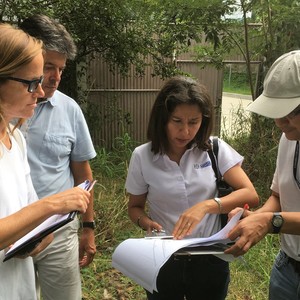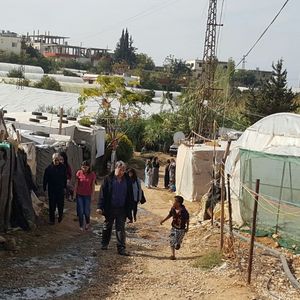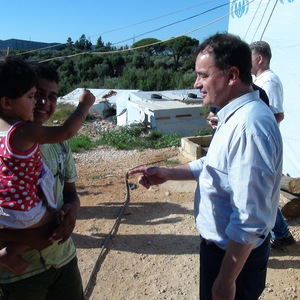Evaluation of the International Development Cooperation Master Plan's first year
| Subject: International Cooperation
This Thursday, April 5th, the first year of the AMB's International Development Cooperation Master Plan 2017-2018 evaluation has been released, characterised by the commitment to the Mediterranean refugees and the raise of social awareness on this issue.
Alfred Bosch, vice-president of the AMB's Area for International Relations and Cooperation, Oriol Illa, director of the AMB's Area for International Relations and Cooperation, and Maria Peix, head of the Cooperation Service, attended the event.
Alfred Bosch underlined that the aim of the Cooperation Master Plan is to fulfil the United Nadion's goals, such as allocate 0.7% of the AMB's resources to international cooperation: "We were quite far from this objective, but now we are very close to it". "We are working with metropolitan areas, because this is what we know best and where we feel more useful", he added.
Maria Peix said "as a public institution, we must ensure human rights and look after the diversity of groups. This is why we place individuals at the centre of our projects".
One of the innovative elements of the Plan is to favour metropolitan governance, based on exchanging knowledge and strengthening the management processes in urban areas of other territories.
Commitment to refugees and environmental challenges in the Mediterranean area
In 2015, once it was acknowledged the impossibility of receiving refugees, the AMB decided to help the countries that were receiving.
The commitment to guarantee the human rights in the Mediterranean zone has been achieved through several projects, focused on eastern Mediterranean countries like Lebanon, Syria, Greece or Jordan.
The main subject has been supporting refuge with projects that include sustainability, aiming to guarantee the human rights of refugees, and improve quality of live in the receiving areas.
Waste management has formed part of three projects: Irbid and Mafraq (Jordan), Amioun (north of Lebanon) and Tripoli Area (Lebanon). Management and awareness plans have been drafted; pilot projects and equipment provision have been set. As a matter of fact, one of the added values of the AMB cooperation is technical cooperation, i.e. transfer and exchange of technical knowledge with the teams working on these areas in order to contribute to the process of land management.
On the other hand, emergency projects have been carried out in Syrian Kurdistan and in Markabta (Lebanon) to distribute essential products and improve refugee settlements.
38% of actions are in the Mediterranean area, of which almost 88% are refuge projects. Those projects prioritise direct work with refugees, placing individuals at the core. Some of the initiatives, such as solid waste integral management, have been carried out coordinating with other public institutions, as a way of concerted cooperation.
Metropolitan governance
One of the sector-based goals of the Plan is to promote, facilitate and strengthen metropolitan governance in urban areas, which is one of the AMB's expertises. This governance is based on planning and managing shared services from a cross-cutting point of view beyond local administrative limits, but taking into account the uniqueness of each urban area. In this sense, three actions have been launched in 2017.
The first one is an exchange and reflection meeting with the Maputo Metropolitan Area (Mozambique), Managua (Nicaragua) and the Metropolitan Area of San Salvador (El Salvador).
It also should be highlighted the agreement to support the metropolitan strategy for transport in the metropolitan area of Maputo, and also a new agreement with the City Council of Managua (Nicaragua) in order to take steps towards the land planning for a metropolitan area through a participatory proposal among the municipalities of the area.
Safe, equitable and inclusive public spaces
This objective has been implemented with a project regarding safe and violence-free public spaces taking into account rights, gender, diversity, governability and environmental sustainability in the metropolitan area of San Salvador. This area has hight civil insecurity and crime rates that affect the right to a violence-free live and the right to the city.
Experts say this is the third most dangerous conurbation in the world, in which citizens feel that public spaces are unsafe, which is why it is getting closed and being privatized.
The project considers public space as a territory for relation, cohesion and empowerment where citizen participation and socioeconomic and cultural dynamism boost the re-building of democratic and fairer cities.
Education for global citizenship in the metropolitan area of Barcelona
The critical awareness of inequalities, problems and conflicts in the world and its causes, as well as the change of attitudes, has been another key point in the first year of implementation of the International Development Cooperation Master Plan.
The AMB has launched the first global metropolitan education Program for global citizenship: "Human Rights at the local level: We have rights, we weave freedoms".
The AMB fosters critical reflection and commitment with the complicity of seven small city councils in the metropolitan area and with the coordination of the organized civil society of the municipalities involved. Coordinated work contributes to the strengthening of metropolitan work with city councils in the area.
The first edition of the Program was dedicated to the human rights of refugees in the Mediterranean. This year, the second edition will focus on the right to refuge and to environmental sustainability. Ten municipalities will participate in it.
The final act of this program will take place on May 5th at Nova Icària beach in Barcelona, with a big party where metropolitan city councils, third sector stakeholders and citizens will participate.
Image gallery
Related documents
Related publications
Where
















































